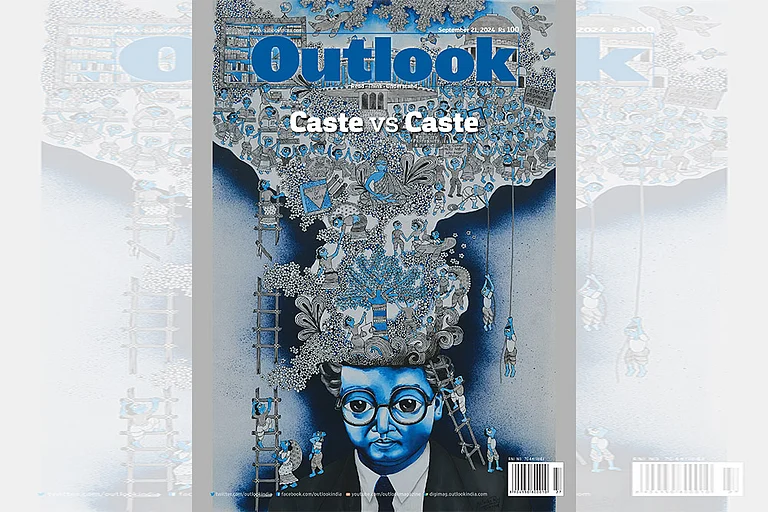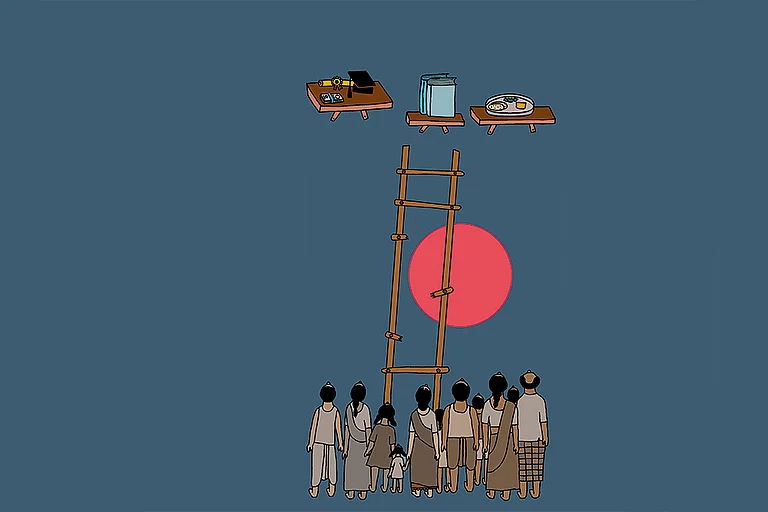In 2020-21, after the death of Dalit leader Ram Vilas Paswan, followed by the split in the Lok Janshakti Party (LJP), people started writing political obituaries of his son Chirag Paswan. But within three years, the wheels took a different turn. He is now not only a Union Minister—his party won five MPs—but he has also already left his mark in Indian politics through his outspoken nature and political convictions. During a conversation with Outlook’s Editor Chinki Sinha and Assistant Editor Abhik Bhattacharya, he shares his views on different issues. Excerpts:
'Where Is The Creamy Layer?': Chirag Paswan Speaks On Caste, Bihar, And His Politics
Union Minister Chirag Paswan had voiced concerns about the recent Supreme Court verdict permitting sub-categorisation of SCs and STs for reservation. He speaks to Outlook on the caste dynamics in his home state of Bihar
When former prime minister and founder of the Janata Dal, V P Singh, implemented the Mandal Commission recommendations to reserve government jobs for Other Backward Classes (OBCs) in 1990, there were widespread protests. But the politics of social justice started taking shape. Now again, there is the question of Mandal and Kamandal politics. Your father, coming from the Mandal tradition, didn’t want to leave the United Progressive Alliance (UPA). But it was you who brought him to the National Democratic Alliance (NDA) in 2014. How did you convince him? How are you navigating through the current political expedients?
Look, I admire my Prime Minister. I like his vision. In 2014, after a long time, the country found a prime minister who, through his speeches, reached each and every Indian. He invoked the idea of Sabka Saath, Sabka Vikas. I share this value as I believe that we should take all people together, irrespective of their class, caste or religion.
My father was quite happy with the UPA. When I told him about joining the NDA, he scolded me and said, ‘Never repeat it again’! I didn’t say anything for another two months. I remember, it was around February 2014—when elections were round the corner—nothing was finalised as far as an alliance was concerned. We needed clarity. The other partners, like the Rashtriya Janata Dal (RJD), started mocking us, saying we would get two and a half seats—one for my father, one for my uncle and half for me! So, it was pretty humiliating. We used to meet Soniaji often. She told us to meet Rahulji as well. But that never happened...
In 2002, after the Godhra pogrom, your father was the first one to leave the NDA. Today’s PM was the then CM of the state. How did your father navigate through it?
Both my father and I believe in judicial prudence. Much before my father joined the NDA, the court verdict on Godhra came out. Even in the case of the Ram Mandir, my father always said that he would go by the decision of the Supreme Court. So, these questions never came to his mind.
With five MPs and a cabinet berth, you have become one of the major faces, both in the Union government as well as in Bihar politics. How has been your journey in politics? What is your social and political vision?
First, I tried my career in films. But, very soon I realised that it was not my choice. I was a disaster! Wherever I went—Delhi, Mumbai—I found how my people, the people of Bihar, are being treated. I observed their miserable conditions. I wanted to work for them. I came back to Bihar leaving the film world and told my father that I wanted to join politics. He was more than happy. Since then, I have invested my life for the people of Bihar. You ask me anything about Bihar—from the economy to migration—I have a plan. With the vision of ‘Bihar first, Bihari first’, I am working relentlessly for the people of my state.
The recent judgement of the Supreme Court has given permission to states to sub-categorise Scheduled Caste/Scheduled Tribe (SC/ST) communities on the basis of data to provide proportionate reservation to the most marginalised. In Bihar, communities like Musahar have rarely got any representation. Still, you have voiced your concerns against the verdict. Why?
One has to understand that certain communities were termed SCs and were given reservation not because of their educational or economic status. Rather, the ground for reservation was the ‘untouchability’ that they experienced some time in history. Against this backdrop, we have to also look into the condition of these communities in today’s times. We can see that even after achieving social status and economic benefits, Dalits are being discriminated against across all layers of society. For example, a Dalit IPS officer has to seek security for taking out his wedding procession. Dalit grooms are not allowed to ride horses during their marriage; a temple has to be purified after the visit of a Dalit chief minister (CM)! If an IPS officer or a CM can face such discrimination for being a Dalit, where is the creamy layer?
Don’t you think that the creamy layer is a different debate? It was a part of the Supreme Court’s observations. How do you connect it to sub-categorisation?
When you are creating sub-categories and saying that a certain population has already got the benefits of the reservation, you are consequently creating a creamy layer. We are not in a position to afford it.
Then, how would you accommodate the most marginalised communities like Musahar, non-Jatavs and so on?
I believe we have enough space to accommodate the marginalised communities if we can fill the reserved seats. If you look at offices of state governments, you will find several seats in the reserved categories vacant. When we start filling these posts, we will be able to accommodate all the marginalised communities. When the question of lateral entry in the bureaucracy came up, I asked the same question. I want to thank my Prime Minister for seriously taking note of it.
The Paswans were included in the Mahadalit category in 2018. As a part of the community, how do you read it?
Some decisions are taken for political expediency. But I have to say that it is Dalit unity that will take us forward towards the path of social justice. Moreover, I personally don’t believe in caste, creed and religion. I am secular.
In 2020, after the death of your father, followed by your uncle’s departure, the situation was very difficult—both for the LJP and you. How did you keep the flock together and make a comeback with a new symbol?
It was the most difficult time of my life. Everything was falling apart. But I learnt it from my father that I can’t be a cry-baby. I had to fight and I did.
The change of symbol actually matters on the ground. When I went to people and asked them to press on the helicopter, they asked, “Why are you lying? We must press on the bungalow (the earlier symbol of the undivided LJP)!” Still, we continued fighting.
Your stepmother, Rajkumari Devi, is in full praise of you. Is the situation better in the family now?
Both of my mothers (mother and aunt) share really good relations. The family is now together. I think I have done a better job than my father on this ground! Papa would have been really happy to see this.
The government has not agreed to give a special package to your state. What is your vision for Bihar?
You can find Biharis across industries. We are at the topmost positions in different parts of the country. Still, we are unable to make a system within the state that controls the brain drain and the migration. In Bihar, you can see people identify themselves by their caste—Bhumihar, Rajput, Brahmin, Dalit, Mahadalit. But you will not find anyone asserting their identity as a Bihari. Different political parties have taken the benefits of this division. Instead of working for development, they have played the caste card to consolidate their votes.
Why can’t we build a film city here? Why can’t we make Bihar an educational hub? The problem is that there is so much stagnant thinking of the politicians who were part of the government at different times. To do all these, we need land.
What about land reforms? Earlier, there were efforts to implement it, but there was disgruntlement among voters. How will you deal with it?
It has become so difficult to get land in Bihar. We have to prepare a government pool. By the way, I don’t do vote-bank politics. If I did, I would have ignored many things.
What will be your strategy for the upcoming assembly election in Bihar?
Though we are part of the NDA, we don’t have much say in the Bihar government as we have no MLAs. I believe that in the upcoming election the situation would be different and we will participate in the government with our constitutive ideas.
You have been very outspoken since you joined the NDA. Don’t you think it is risky in coalition politics?
I believe that I have a long political career. If I stick to my principles and thoughts, only then I will be able to survive. Otherwise, people won’t believe me. My father also saw turbulent times. I thank my Prime Minister for giving me the space to explain my stance, when needed.
(This appeared in the print as 'Where Is The Creamy Layer?')


